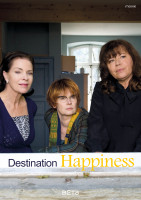Endstation Glück Filming Locations

Where was Endstation Glück filmed? Endstation Glück was filmed in 2 locations across Germany in the following places:
Endstation Glück Filming Locations
Munich, Bavaria’s capital, is home to centuries-old buildings and numerous museums. The city is known for its annual Oktoberfest celebration and its beer halls, including the famed Hofbräuhaus, founded in 1589. In the Altstadt (Old Town), central Marienplatz square contains landmarks such as Neo-Gothic Neues Rathaus (town hall), with a popular glockenspiel show that chimes and reenacts stories from the 16th century.
Endstation Glück (2016)
A trip around the world with her husband Georg, seeing the North Cape and Tierra del Fuego, that was Helene's great dream during the decades of her family phase. After Georg's retirement, the time had finally come. But after his unexpected death, the trip falls flat, instead Helene inherits a loan-financed, disused railway station and not much else. Helene is sad and angry at the same time, that's not how she imagined the new beginning in her life. Her two friends Rosina and Luise try to comfort and build her up, but struggle with their own changes. Rosina is still living in her career as a musical star in the USA, bookseller Luise in her cocoon of books and theories. But the stages are no longer queuing at Rosina and Luise has been given notice of the apartment. So it seems like a good idea to move into the station together, at least temporarily. The former railroad worker Arthur, who has the right to live in the station for life, cannot prevent the spontaneous flat share, although he does his best to drive the three women away. A newbeginning? For Helene at least a chance to evade the demands of her slightly chaotic daughter Corinna. As a single parent and, in contrast to Helene, she is extremely adventurous, Corinna expects her mother to provide both financial support and care for her daughter Lilly. Helene tries to refuse. But the practiced behavior doesn't really let go of all three: Helene still tends to give up all her plans as soon as someone makes her feel guilty, and Luise remains fascinated by dying. Rosina, on the other hand, works on her father in the old people's home, who, even decades later, still despises her for her career choice and holds Luise as a role model. Nevertheless, in small steps, the three of them manage to draw strength and lightness for the resistance of life from their coexistence in the old train station.
